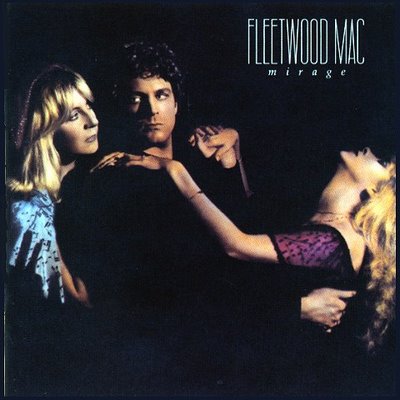
Mirage (1982)

1. Love in Store
2. Can't Go Back
3. That's Alright
4. Book of Love
5. Gypsy
6. Only Over You
7. Empire State
8. Straight Back
9. Hold me
10.Oh Diane
11.Eyes of the World
12.Wish You Were Here
By the dawn of the 1980s, Fleetwood Mac appeared to be drifting toward dissolution. Following the genre-bending sprawl of Tusk and the immense success of their solo ventures—particularly Stevie Nicks, who emerged as a bona fide star in her own right—the band found itself fragmented. Nicks enchanted the world with her solo debut, while Lindsey Buckingham used his own to indulge his more eccentric tendencies. The question, naturally, was whether there was anything left to hold the “classic” lineup together. Remarkably, there was.
The reunion produced Mirage, released in 1982. The title is apt. It sounds like a Fleetwood Mac album, looks like one, and at times even feels like one—but the magic is curiously muted. It’s as if the band decided to retreat from the artistic risks of the past and instead deliver a record designed to reassure rather than challenge. For a band that had spent the past decade redefining itself with each release, this one feels like a holding pattern.
Lindsey Buckingham, who had driven Tusk with wild, experimental fervor, appears here as a man very much on a leash. His contributions—Book of Love, Empire State, Oh Diane—are catchy, but oddly neutered. Gone is the nervous brilliance of Not That Funny or Tusk. In its place: slick, tightly wound pop tunes that feel more like contractual obligations than genuine inspiration. Even Eyes of the World, one of the few tracks with any real pulse, sounds like a shell of its live counterpart. On stage, the song breathes, stretches, and snarls. Here, it sits politely in its chair. That said, Buckingham had recently released his own solo album (Law and Order), so one imagines he had already gotten his more adventurous instincts out of his system. Still, the sense of creative compromise lingers throughout Mirage—as though everyone agreed, perhaps tacitly, not to rock the boat.
Stevie Nicks fares a bit better, though she’s surprisingly underused. Gypsy is the album’s crown jewel—elegant, wistful, and utterly Nicks. It’s also the only track here that feels like it could’ve comfortably sat on Rumours or even her solo debut Bella Donna. Her other two songs are more subdued. Straight Back is pleasant but forgettable, while That’s Alright veers into country-pop territory with surprising ease. It’s charming—almost in spite of itself—and makes one wonder why the band didn’t explore this aesthetic further.
Christine McVie, as ever, delivers with quiet consistency. Hold Me was the album’s biggest hit, and for good reason. It’s warm, melodic, and quintessentially Christine—her talent for crafting simple, emotionally resonant pop never more apparent. Love in Store, which opens the album, is perhaps the most underrated track in the set: breezy, infectious, and every bit the equal of You Make Loving Fun or Everywhere. She remains the band’s melodic anchor, keeping things grounded while Buckingham and Nicks orbit in their respective galaxies.
In the end, Mirage is a competent, polished record that commits the mildest of sins: it plays things safe. It doesn’t strive for transcendence, nor does it implode under the weight of its own ambition (as Tusk nearly did). It simply exists—pleasant, professional, and perhaps a bit too polite for its own good.
As a snapshot of a band reconvening after flying in separate directions, Mirage makes sense. But as a successor to Rumours and Tusk, it feels like a retreat. Not a bad album by any means, but one that lands softly where the band had previously soared.
Go back to the main page
Go To Next Review